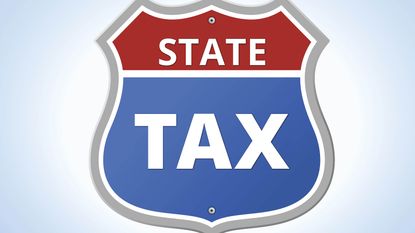Living and Working in Different States Can Be a Tax Headache
Living in one state and working in another can trigger a number of tax issues. Here are several things to keep in mind if you and/or your spouse are in this situation.


Lately, more people are getting jobs a different state than where they live. But living in one state and working in another can bring up potentially complciated tax issues. For instance, if you live in one state and work in another, which state income tax return should you file? Do you need to pay taxes for two states? Let's try to answer some of those questions.
Where to file taxes if you live and work in different states
The question of where you're deemed to be a "resident" is an important one in determining which state will tax your income or how your employer will withhold taxes from your paycheck.
For residents of a state, all income from sources inside and outside that state can be taxed by the state. When it comes to nonresidents, however, states have less power to tax. A state can only tax a nonresident on income generated within its borders, such as wages from a job in the state. But that also means you'll typically have state taxes withheld from your pay by the state where you work.

Sign up for Kiplinger’s Free E-Newsletters
Profit and prosper with the best of expert advice on investing, taxes, retirement, personal finance and more - straight to your e-mail.
Profit and prosper with the best of expert advice - straight to your e-mail.
So, what makes someone a resident of a state? You are generally deemed to be a resident of the state in which your primary home is located, assuming that you have spent more than half of the year in that state.
But there are some exceptions to that general residency rule. For example, if someone has two houses in two different states, those states can look at other factors to determine your state of residence. Those factors might inlcude:
- where you vote,
- where you have a driver's license, and
- where your personal and professional links are found.
Additionally, some states also have a "183-day rule." The 183 day rule basically says if you are in the state for more than 183 days, you could be deemed a "statutory resident." (That would make you liable for taxes as a resident in that state).
Convenience of the Employer Test
A handful of states apply a "convenience of the employer" test. That test that can result in your wages being taxed by the state where your employer is located instead of by the state where you live, even if you never set foot in the state where the employer is based.
This often affects people who telecommute for a company that is in a different state, which is happening more since remote work increased because of the pandemic.
Under the "convenience of the employer" test, if an employer requires the employee to work in another state (employer's convenience), then taxes and withholding are based on the location where the work is performed. If, however, the employee chooses to work in another location (employee's convenience), then taxes and withholding are based on where the employer is located.
Do I have to file taxes in two states?
Generally, if you're a resident of the state in which you work, you will just file one state tax return at the end of the year.
But what happens if you aren't a resident of the state in which you work? This can mean filing multiple state tax returns, and possibly dealing with double taxation issues (which we will discuss below).
If this is your situaiton, the tax return for the state where you work will be a nonresident return. In that state tax return, you will list only the income earned and taxes paid in that state. The other state tax return will be a resident return for the state where you reside.
One exception to this rule is if you live or work in a state that doesn't have state income tax.
So, for example, if you live or work in Alaska, Florida, Nevada, South Dakota, Tennessee, Texas, Washington, or Wyoming, you won't need to file a state income tax return for that state.
Note: New Hampshire is not included in that list, even though it doesn't have a state income tax. That's because New Hampshire still requires a state return if you have dividends or interest income during the year.
Reciprocity agreements: living and working in different states
Another exception to the rules requiring people to file a tax return for the state where they work involves what is called a reciprocity agreement. These agreements, which are made between states, allow residents to work out-of-state yet only file a state tax return for the state in which they reside. Also, under a reciprocity agreement, you'll only be subject to income tax withholding for the state in which you reside.
Keep in mind that the protections of a reciprocity agreement are not automatic. In order to properly take advantage of the agreement, you must tell your employer to withhold taxes based on your state of residence, rather than the state where you work. If you don't do this, you'll continue to be taxed by both states and forced to fill out two state tax returns.
Be careful if you are moving while involved in a reciprocity agreement. If you are permanently moving to a state in which there is no reciprocity agreement with the state where you work, you will lose all benefits of the agreement. In thatsituation, you would need to ask your employer to withhold income tax in the state where you work and the state where you reside.
Currently, 16 states and the District of Columbia have state tax reciprocity agreements. Please check with the state tax agency where you live to find out if you're in one of them.
Do you pay more taxes if you live in one state and work in another?
If you're required to file multiple state tax returns because you live in one state and work in another, does that mean you'll pay taxes two separate times on the same income? The answer is no.
After you fill out a state tax return for the state where you work, you'll file a second tax return for the state where you reside. On that return, you'll report how much your tax liability was on the first state tax return.
All states allow their residents to claim a tax credit based on the taxes paid to other states. Note, however, that there isn't any guarantee that the state tax credit will always equal what you paid in taxes to the state where you work.
For those who pay estimated taxes, you'll need to make estimated tax payments to each state based on your expect income, deductions, and credits. Therefore, it's important to talk to a tax professional when filing out estimate tax forms.
Moving to another state
What if you live and work in one state for part of the year, and then pack your bags and move to another state to take another job during the same tax year? In this situation, you're technically a resident of two states during the year. This means that you'll need to file two separate state tax returns for the year.
Depending on the state, you may be able to pay taxes as a part-year resident. Most states allow for a person to be a part-time resident for tax purposes if they move into the state during the year with the intent of becoming a resident or leave the state with the intent to reside elsewhere. By doing this, you can divide your income between the two states and not pay tax on the same income two separate times.
Again, this will heavily depend on whether the state at issue has a part-year residence status. Check with the state's tax agency to learn these rules.
What if my spouse has a job in a different state?
Assuming both states at issue have a state income tax and there's a reciprocity agreement between them, both you and your spouse will need to file a state tax return for the state where you reside. If your spouse works in another state that doesn't have a reciprocity agreement with the state where you live, they will need to file a separate return as a nonresident in the state where they are employed.

William joined Kiplinger in July 2021. Prior to this, William worked in the tax world for over 15 years. He spent time working at the IRS, the U.S. Tax Court, and several private law firms where he dealt with both individual and corporate clients. He has a B.A. in Journalism from the University of Georgia, a J.D. from the Loyola University College of Law, and an LL.M. in Taxation from the Northwestern School of Law.
-
-
 IRS is Targeting Promoters of Abusive Tax Schemes Kiplinger Tax Letter
IRS is Targeting Promoters of Abusive Tax Schemes Kiplinger Tax LetterTax Letter Tax schemes range from basic tax dodges to highly complex transactions.
By Joy Taylor • Published
-
 How to Save on Prescription Medication
How to Save on Prescription MedicationHow you can save money on prescription medication amidst rising prices.
By Erin Bendig • Published
-
 States With Low and No Capital Gains Tax
States With Low and No Capital Gains TaxCapital Gains Tax Low-tax states, including states with no capital gains tax, are selling points for many people lately.
By Kelley R. Taylor • Published
-
 94-Year-Old Prevails in Home Equity Supreme Court Case
94-Year-Old Prevails in Home Equity Supreme Court CaseThe U.S. Supreme Court ruled that "home equity theft" violates the Constitution.
By Kelley R. Taylor • Published
-
 Texas Imposes New Tax on Electric Vehicles
Texas Imposes New Tax on Electric VehiclesTexans who own or buy electric vehicles will soon see their registration costs jump nearly 800%.
By Katelyn Washington • Published
-
 Half of Mothers Have Little or No Retirement Savings
Half of Mothers Have Little or No Retirement SavingsMother’s Day comes and goes, but many moms face future financial insecurity because they have little or no retirement savings.
By Kelley R. Taylor • Last updated
-
 Having a Baby Could Soon Cost Less in These States
Having a Baby Could Soon Cost Less in These StatesHaving a baby is expensive, but these states are trying to make it less costly by eliminating the tax on diapers.
By Katelyn Washington • Published
-
 The Most Expensive States to Die In (Due to Death Taxes)
The Most Expensive States to Die In (Due to Death Taxes)You probably know the cost of living in your state, but what about the cost of dying — death taxes?
By Katelyn Washington • Published
-
 Is High-Yield Savings Account Interest Taxable?
Is High-Yield Savings Account Interest Taxable?Think a high-yield savings account is a good idea? Don’t forget that savings account interest is taxable.
By Katelyn Washington • Published
-
 2023 Georgia Tax Rebates Up to $500 Are Now Being Sent
2023 Georgia Tax Rebates Up to $500 Are Now Being SentGeorgia has started sending special 2023 surplus tax refunds to eligible residents.
By Kelley R. Taylor • Published









